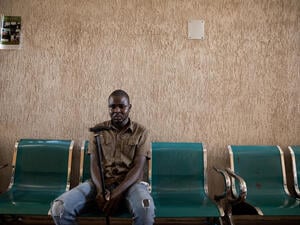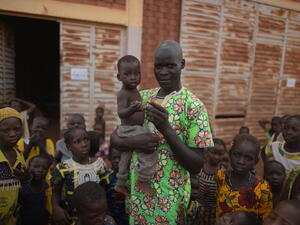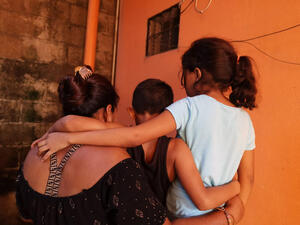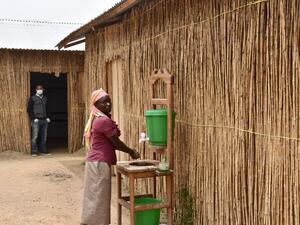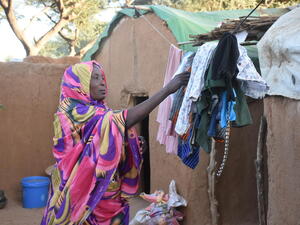Zero violence needed to restore trust in Darfur, says Lubbers
Zero violence needed to restore trust in Darfur, says Lubbers
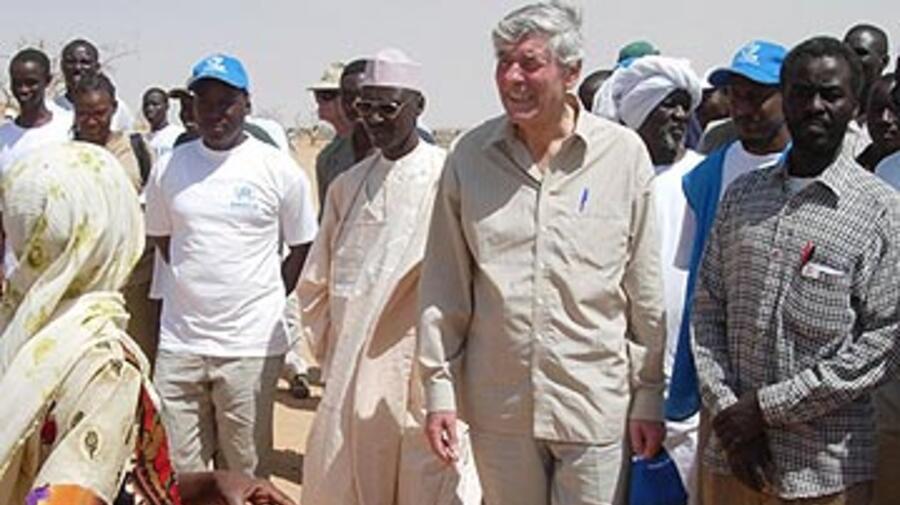
High Commissioner Ruud Lubbers meeting refugee leaders and aid workers in Iridimi refugee camp in eastern Chad.
EL GENEINA, Sudan, Sept 27 (UNHCR) - Midway through a five-day mission to Chad and Sudan's strife-torn Darfur region, UN High Commissioner for Refugees Ruud Lubbers said Monday that a complete end to violence is the next crucial step in convincing hundreds of thousands of uprooted Darfurians that they may eventually be able to go home.
Visiting three camps for internally displaced people in West Darfur on Sunday and Monday, Lubbers was told of the enormous mistrust between the displaced population and Sudanese authorities. At Seliah camp 100 km north of provincial capital El Geneina on Monday, displaced people said up to three Darfurians had been killed by militiamen outside the camp over the past few days.
The High Commissioner said that restoring trust and confidence first requires a total end to violence in the Darfur region. Although the security situation has improved in recent months, more than 1.4 million people have been displaced and are still afraid to go home amid continuing reports of attacks by Janjaweed militia.
In meetings with various Sudanese officials in Darfur, Lubbers urged the government to end all violence. "Every additional incident contributes to the enormous fear and mistrust that has already been generated among the displaced," he said. "Zero violence must be achieved."
Rebuilding trust and confidence is also promoted by the presence of UNHCR and other international organisations in the region, Lubbers said. In a meeting with West Darfur Governor Abdalla Sulaiman Adam on Sunday, the High Commissioner expressed appreciation for the cooperation of the authorities in allowing UNHCR access to uprooted populations.
"Through the presence of other international organisations, we help to signal to everyone on the ground that there should be no more violence," Lubbers told the governor. "And through the provision of assistance and protection, we can help give the uprooted people in Darfur the confidence not to flee but to stay. We want to increase the level of confidence and to do that, we need to work together."
Lubbers said UNHCR did its work in an impartial way. "If we take sides, it is only on the side of the victims, the uprooted people," he said.
In West Darfur's Riad camp on Sunday afternoon, the High Commissioner met some refugees who had previously fled to Chad and then decided to return to Darfur about seven to nine months ago on the assumption that they would get assistance and be able to rebuild their lives. Instead they have come back only to be confined to this miserable hillside camp, afraid to venture out. The displaced people told Lubbers that it was only the presence of the UN and non-governmental organisations that have kept them from fleeing back to Chad.
Riad camp hosts more than 5,000 displaced Darfurians while Ardamata, the third camp on the High Commissioner's itinerary, hosts an additional 35,000 on the outskirts of El Geneina. Many more are scattered in makeshift camps in other parts of West, North and South Darfur provinces.
Another close to 190,000 Darfurians have crossed the border into neighbouring Chad. Before travelling to West Darfur, High Commissioner Lubbers on Saturday visited some of these refugees in eastern Chad's Iridimi camp near Iriba, a desert village 70 km from the Sudanese border.
Arriving at the camp with a delegation of donors, he was greeted by rows of women and children who danced and sang in his honour. Refugee women wearing the brightly-coloured robes of their native western Darfur region presented him with a painted clay pot of red flowers, a generous gesture in an area where the vegetation is mostly limited to desert shrubs.
"We turn to the left, we turn to the right to see you.... Welcome, welcome and please help us go home," children sang, raising their arms up in the air as Lubbers walked along a specially created path on the sand that was delineated by two long rows of small rocks.

High Commissioner Lubbers being greeted by the Governor of the Ouaddai region in Abéché, eastern Chad.
Although most of the refugees probably did not know who their famous visitor was, they seemed mesmerised by the attention he was getting and the large coterie of officials, humanitarian workers and journalists following him wherever he went. Children gazed at him with wide open eyes and broad smiles.
The High Commissioner first made his way up a small hill dominating the camp where two huge water tanks are located. He also visited a medical centre and special feeding areas, and held a long meeting with members of the refugee committee.
On Friday, Lubbers had met with top Chadian officials in the capital of N'Djamena, including Prime Minister Moussa Faki. He also met with the Governor of the eastern Ouaddai region, as well as with the prefect in Iriba.

